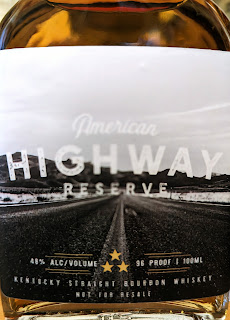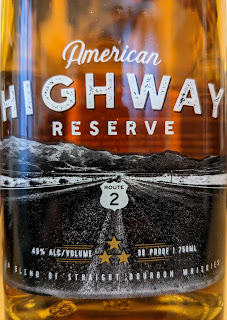Mrs. Whiskeyfellow likes Brad Paisley. When I told her that I received samples of American Highway Reserve to review, it made her happy. Aside from being a country music artist, she finds him a great family man and a phenomenal guitarist. No pressure, right?
American
Highway Reserve has a schtick similar to Jefferson’s Ocean
and OH Ingram River Aged. They partially age the whiskeys on something that moves, encouraging
more significant interaction with the wood, and something magical is supposed
to happen. In the case of the two brands mentioned above, they’re aged on the
water.
American
Highway Reserve is produced by Bardstown
Bourbon Company. According to Dan Callaway,
the Vice President of New Product Development for Bardstown, Paisley hasn’t
just attached his name to this whiskey. He involved himself in most aspects of
the production, from selecting barrels to aging to helping solidify the final
blends.
“He’s more than a casual consumer - he really understands whiskey so he’s made a great partner in this endeavor. It’s been a fun journey so far and we’re excited to see where the next Route takes us.” - Dan Callaway.
The
first incarnation of American Highway Reserve, dubbed Batch 1,
is aged in a 53’ semi-trailer that followed Brad Paisley’s bus around during
his 2019 nationwide tour. The second, aptly named Route 2, was recently released and followed his
2021 summer tour. There are significant differences between the two, and I’ll
address those individually. But before I get there, I have to #DrinkCurious.
Before that, I must thank Bardstown Bourbon Company for sending me each sample
in exchange for my no-strings-attached, honest reviews.
American
Highway Reserve, Batch 1
The inaugural release of American Highway Reserve began with a blend of four Bourbons sourced from undisclosed Kentucky distilleries, including Bardstown Bourbon Company. The mashbills are, per Bardstown:
- 28% of a three-year Bourbon (71% corn, 21% rye, and 9% malted barley – yes, I know that’s 101%);
- 25% of a three-year Bourbon (60% corn, 36% rye, and 4% malted barley);
- 24% of a 13-year Bourbon (74% corn, 18% rye, and 8% malted barley); and
- 23% of a 15-year Bourbon (78.5% corn, 13% rye, and 8.5% malted barley.
The
semi-trailer traveled 7,314 miles across 25 states, with an average temperature
of 93.5°F. The result was a 96°, non-age-stated Bourbon with a suggested retail
price of $99.99. There were about 10,000 cases available domestically.
Appearance: I
sipped this whiskey neat from my Glencairn glass. It was a caramel-shaded amber
that formed a medium rim. Thick but slow tears ran down the wall.
Nose: The
first thing I smelled was bubblegum, followed by corn, caramel, toasted oak,
and apricot. A hint of minty rye spice was buried by those other notes. When I
inhaled through my mouth, brown sugar flowed over my tongue.
Palate: With
the first sip, my palate had a WTF moment. It was as if everything simultaneously
rushed me. I couldn’t even figure out the mouthfeel! I gave it a moment and took
a second sip. The texture was halfway between airy and creamy, and the front of
my palate pulled out corn, bullseye candies, and marzipan. Flavors of dried apricot,
old leather, and cinnamon sugar were at mid-palate. Charred oak, spicy rye, and
cocoa powder created the back.
Finish: The
long-lasting finish consisted of cocoa powder, caramel, rye spice, and leather.
Bottle, Bar, or Bust: This is
where the peddle hits the metal, and I look at both the experience and the
value statement. While a lot was going on flavor-wise, making sense of what I
had tasted was difficult. In some ways, it seemed disjointed. I appreciate what
Bardstown and Paisley did, but I don’t believe I’d want to pay the $100 bill.
As such, Batch 1 takes my Bar rating.
*****
American
Highway Reserve, Route 2
The follow-up release of American Highway Reserve began with a blend of three Bourbons sourced from undisclosed Kentucky and Georgia distilleries and Bardstown’s own distillate. The mashbills are, per Bardstown:
- 27% of a four-year Kentucky Bourbon (70% corn, 21% rye, and 9% malted barley);
- 7% of a 12-year Kentucky Bourbon (78% corn, 10% rye, and 12% malted barley); and
- 66% of an eight-year Georgia Bourbon (80% corn, 10% rye, and 10% malted barley).
Per
Paisley:
“Bourbon is like a song: the more life it has lived on its journey, the deeper the story, the richer it becomes. This second batch has seen more miles. I think you will be surprised at the unique character a different journey created.”
Route
2 is bottled at 98°, and you can expect to pay about $99.99 for a 750ml
package. It, too, has a US distribution of about 10,000 cases.
Appearance: Like Batch
1, I sipped Route 2 neat in my Glencairn glass. It was lighter in color, more
of a classic amber. A medium-thick rim generated fast, watery legs.
Nose: Toasted
oak, peach, plum, and berries formed a bright aroma. Drawing the air past my
lips offered a bold caramel taste.
Palate: The
oily mouthfeel was light and tingly, with apricot, peach, and starfruit on the
front. I found flavors of tobacco leaf, leather, and caramel in the middle of
my palate. The back experienced clove, nutmeg, and rye spice.
Finish: It wasn’t
until the finish that I tasted oak. It was joined by tobacco from the middle
and nutmeg and rye spice from the back. The rye spice lingered the longest.
Bottle, Bar, or Bust: While
the whole experience made sense to me, Route 2 still lacks the wow factor
deserving of a Benjamin Franklin price. You’ll want to taste this at a Bar
before committing to a purchase.
Final Thoughts: Between the
two, I preferred Route 2. It flowed better and was easier to simply sit back,
sip, and enjoy, whereas Batch 1 was disorganized. However, they both get the
same rating from me. Cheers!
My Simple, Easy-to-Understand
Rating System
- Bottle = Buy It
- Bar = Try It
- Bust = Leave It
Whiskeyfellow encourages
you to enjoy your whiskey as you see fit but begs you do so responsibly.



Comments
Post a Comment
As we should drink in moderation, all comments are subject to it. Cheers!